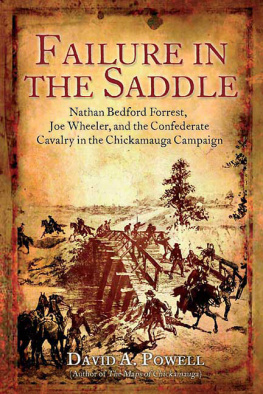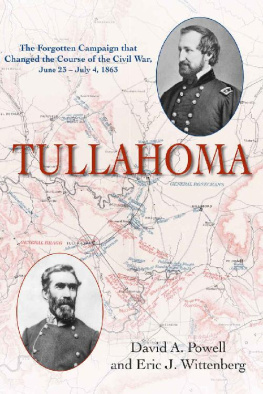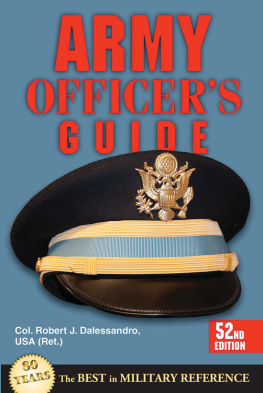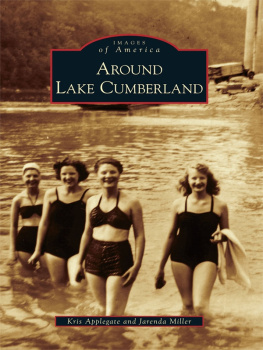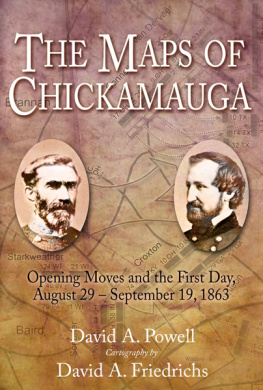
This edition is published by PICKLE PARTNERS PUBLISHINGwww.picklepartnerspublishing.com
To join our mailing list for new titles or for issues with our books picklepublishing@gmail.com
Or on Facebook
Text originally published in 1963 under the same title.
Pickle Partners Publishing 2015, all rights reserved. No part of this publication may be reproduced, stored in a retrieval system or transmitted by any means, electrical, mechanical or otherwise without the written permission of the copyright holder.
Publishers Note
Although in most cases we have retained the Authors original spelling and grammar to authentically reproduce the work of the Author and the original intent of such material, some additional notes and clarifications have been added for the modern readers benefit.
We have also made every effort to include all maps and illustrations of the original edition the limitations of formatting do not allow of including larger maps, we will upload as many of these maps as possible.
MORALE IN THE ARMY OF THE CUMBERLAND DURING THE TULLAHOMA AND CHICKAMAUGA CAMPAIGNS
by
Major Robert J. Dalessandro, USA
TABLE OF CONTENTS
Contents
TABLE OF CONTENTS
ABSTRACT
This study examines insights into the state of morale of the Army of the Cumberland during the period of the Tullahoma and Chickamauga campaigns. The thesis covers the period from June through September 1863.
The thesis focused on the organization and leadership of the Army of the Cumberland. It then examined morale as the whole of diverse factors, including national and individual factors. National factors were generally out of control of the army leadership. They included a soldiers motivation for joining the army, his views toward southern sympathizers at home, the impact of John Morgans Ohio Raid, soldier views on conscription, and effects of the progress of the war on morale. Individual factors comprised concerns for home, family, business, and religion. These areas were also largely beyond the influence of the army leadership.
The study then examined morale factors the army could control. It explored army life, attitudes toward leadership, level of discipline, how the army leadership cared for solders, and the impact of mail on soldier morale. The thesis concludes that the Army of the Cumberland was a well lead organization. Consequently, the state of morale of the army was high throughout the Tullahoma campaign and was not significantly diminished as a result of the defeat at Chickamauga.
The thesis further concluded that soldier confidence in Major General William S. Rosecrans remained high throughout the period of the study. Confidence in many corps and some division level commanders did, however, suffer as a result of the Chickamauga defeat.
Additionally, the thesis concluded that Major General Rosecrans had been undermined from within his own headquartersultimately leading to his relief.
LIST OF TABLES
Table 1: Chronology of the Tullahoma and Chickamauga Campaigns.
LIST OF FIGURES
Fig. 1: John Morgans Ohio Raid.
CHAPTER 1INTRODUCTION
In war morale is to the physical as three to one.Napoleon Bonaparte, Warrior Words
In the early morning hours of October 20, 1863, John Sanderson penned a note in his diary. What the effect of this removal will be upon the morale of this army. I know full well. I dread the consequences. {1} The staff still lay sleeping around him as he rose from his makeshift bed. He slowly walked the short distance and tentatively awoke the general. Both he and the general had little sleep the previous evening. Major General William S. Rosecrans had held a final meeting that lasted well past midnight with his successor, Major General George Thomas. They discussed details of Rosecrans plan for the defense of Chattanooga. At 0500 on October 20, 1863, Rosecrans left his headquarters at the Army of the Cumberland for the last time. There was no fanfare. A handful of men saw Rosecrans off. Some wept openlybut Rosecrans kept a cheerful face, despite his sorrow. {2}
Many events had passed since his assumption of command. Just weeks before, he was hailed as the Nations most capable general, perhaps even a future presidential candidate. Now, he had been relieved of his command. In the words of the Assistant Secretary of War Charles Dana, the soldiers have lost their affection for Major General Rosecrans....The state of this Army is lower than at any time since Bull Run. {3} What had gone wrong? In the summer of 1863, the Army of the Cumberland was the most successful fighting force that had ever marched and fought in the Western Hemisphere. Now, it faced possible destruction at the hands of General Braxton Bragg and his Army of Tennessee.
The eight months between the victory at Stones River and the defeat at Chickamauga had been eventful. Following the defeat of the Army of Tennessee at Stones River in January 1863, Major General Rosecrans army went into winter camp in Murfreesboro, Tennessee. In June, he resumed operations in what is called the Tullahoma Campaign. Despite unfavorable weather conditions, Rosecrans Army of the Cumberland made extraordinary progress toward the vital railroad center at Chattanooga. By September, his army had advanced over 125 miles and had managed to take the town of Chattanooga without firing a shot. The Army of the Cumberland seemed invincible. With the victories at Gettysburg and Vicksburg in July, it seemed as though the capture of Chattanooga would finally seal the fate of the Confederacy.
The fate of Chattanooga, and perhaps the Confederacy, would be decided near the Tennessee/Georgia border at a little known creek called Chickamauga. The fortunes of war and not the generals were to select the location. The final defeat of the Army of Tennessee seemed inevitable. Although outnumbered, Rosecrans men had fought wellit seemed that victory was in reach. At 1130 on September 20, 1863, Rosecrans and his Army fell apart. Within the hour, Rosecrans unbeatable juggernaut was retreating in disarray to Chattanooga. Was leader and soldier morale a factor in the disaster at Chickamauga? This thesis explores the effect of morale on the leaders and soldiers of the Army of the Cumberland prior to and following the defeat at Chickamauga.
This study will investigate the following research questions: What was the state of morale across the Army of the Cumberland preceding and subsequent to the Battle of Chickamauga? Dr. Francis Lord states that morale was directly affected by the soldiers confidence in their officers, especially in their regimental commanders. {4} He adds, there was a direct relationship between good discipline and high morale. {5} To this end, the work must satisfactorily answer the primary question, and resolve the following:
1. Did officers have confidence in Major General William S. Rosecrans and his staff?
2. Was confidence in Rosecrans abilities undermined from within his own headquarters?
3. Did the soldiers have confidence in their officers?
4. What was the state of discipline in the Army of the Cumberland?
Studies of both morale and its impact on men abound. These studies, however, seem to focus on the World War I and World War II eras. Little work has been put forward on the great armies of the American Civil War.




